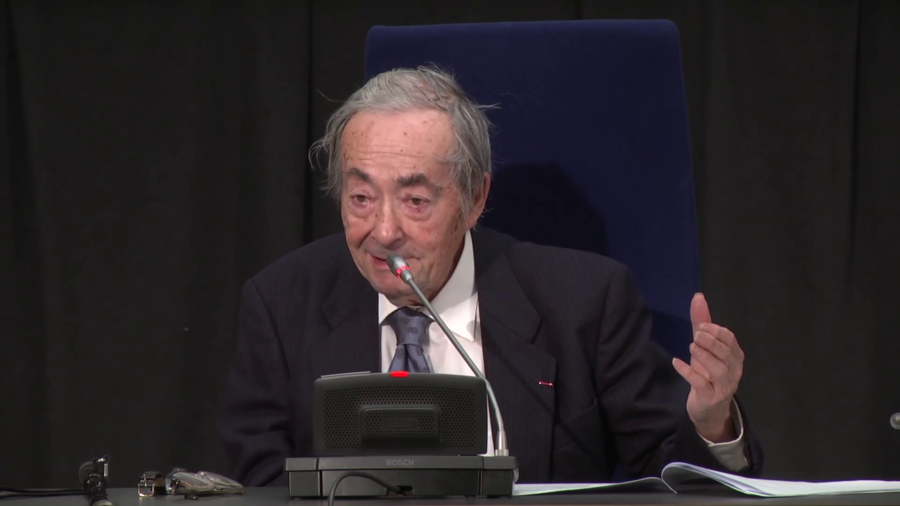[The first portion of this lecture can be found here.]
George Steiner: What is worse? In singular instances, writers, musicians, artists, and academics sided more or less overtly, or by indifference with the agencies of the inhuman. Goethe’s garden is a few thousand yards from Buchenwald. Heidegger lectured on Hölderlin. Sartre regarded occupied Paris, I quote, as “a perfect proliterary and philosophic production,” end of quote. In short, when we invoke the ideals and practices of the humanities, there is no assurance— (You touched on this in your most generous introduction.) There’s no assurance that they humanize. My sense of the question simply torments me. I use the great phrase of the American poet Wallace Stevens, “supreme fictions.” Supreme fictions may, may enable us to forget the cry in the street. I come from a seminar in the afternoon, having taught let’s say the third and fourth acts of Lear. I am completely enveloped in the tortures of Cordelia and the cry of Lear, “Never, never, never, never, never.” And somebody screaming in the street, “Help me.” And I don’t hear it. In some mysterious sense, I don’t hear it. This haunts me.
A second major factor may relate to the democratization of higher education. To the accelerating extension of university entry to virtually every order in society. Yes, human potentialities are indeed widespread. Yes, they are far too often suffocated by economic injustice and discrimination. Ladies and gentlemen, the faculties of the human mind, its potentialities, are not—are not—infinitely elastic. Sorry.
Talent, let alone genius in the arts, is enigmatically rare and unpredictable. So it is in the gymnastics of the brain. The number of women and of men, of men and of women, qualified to respond to a chorus in Aeschylus, to a categorical proof in Kant, to a Duino elegy in Rilke, may be larger than hierarchical reactionary ideologies assume. It is not, however, limitlessly large. The sciences have no hypocrisy about this—we do. We humanists lie to ourselves continually. The sciences say, “Sorry, you can’t do an equation of the fifth degree. Sorry, goodbye. Become a banker.” [audience laughs] You don’t survive a first-rate science course of the first year if you don’t know how to do the damn things. They don’t bluff, they can’t bluff. They’re not going to lose their time with bluffing. The sciences rapidly weed out the inept, those to whom elliptic functions or string theory are simply inaccessible. There is no egalitarian contract, no democratic agreement with transfinite numbers, believe me.
Today the humanities flinch from any rigor in recruitment, from any acknowledgment that the enrollments in many spheres of social and literary studies are bloated and vulgarized to a destructive measure. It has become almost impossible to get rid of students totally unqualified to take your class. It has become almost impossible—administratively, politically, ideologically. Our science colleagues have no such problems. They know what they’re doing, and they say, “Sorry.” This is becoming truer and truer as the sciences become more and more complexly mathematical.
There may in a final analysis be a structural element in our crisis. We noted the theological origins of our Western universities and that the emancipation from theology has left a kind of emptiness, a disabling void. Cardinal moves in academic teaching and research were grounded in theological assumptions of an authority—authoritas, that beautiful word—of textual precedent and reverence of tradition. Inevitably the secular disciplines transferred, developed techniques of understanding, communication, and formal presentment inherited from what are understandably still schools of divinity. But a substantive legitimation, the underwriting— That’s a very powerful word. To under-write something. To re-insure. The underwriting on which these axiomatic reflexes were founded, are now like reproachful ghosts. They can no longer provide reassurance. In the beginning was the word, the logos. From it, evolved humanistic literacy. When that word is no longer audible, the ontological foundations of philosophic, literary, and historical studies are broken.
[The third and final portion of this lecture can be found here.]
